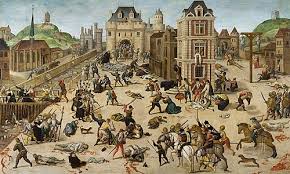It is an unfortunate accident of history – insofar as we may speak of accidents, when all things are guided in their providential design by a good and provident God – that today’s feast is connected with one of the more scandalous events in the history of the Church, the massacre that goes by the name of this Apostle, which he would have abhorred.
The sixteenth century, following upon the chaos unleashed by the Protestant revolt against the unity of Christendom, saw a series of brutal ‘wars of religion’, which also involved territorial, national and ethnic claims. As Chesterton once quipped, it is not as though religion is not worth fighting for; rather, it is in the end the only thing worth fighting for. If religion be that which is ‘master of our affections’, as Saint Thomas put it, that in which we put our faith and from which we direct all our lives: God, hearth, home, family, kith, kin, property, life and limb. What else would we fight for, if these realities most near and dear are attacked in their very roots?
It is thus that we should see the massacre on this day – one of those historical cudgels with which many beat the Catholic Church. On August 24th, 1572, a momentous wedding took place – Margaret of Valois, sister of the French King, Charles IX, daughter of the powerful Catherine de Medici, was set to marry the handsome. Bourbon prince, Henry of Navarre. Now, Henry was a Protestant Huguenot – the term for a French Calvinist.
Catherine thought that the match would help heal tensions between the Catholics and Huguenots, which were running high – just over a month before, on July 2, 1572, Calvinist troops had tortured and murdered nineteen innocent priests in Gorkum, Holland, their bodies left hanging from the rafters.
The effect, alas, was opposite to what Catherine hoped, and the Catholics in Paris – a city then staunchly attached to and protective of the Faith, thought that the Huguenot elite, concentrated in great numbers in the capital city for the upcoming nuptials, would take the opportunity to launch a dastardly surprise attack upon them. Perhaps, perhaps not.
One way or the other, the Catholics decided to strike first, and what makes this even more distressing is that Catherine de Medici, along with her weak, vacillating kingly son, Charles, both seem to have been murkily implicated in urging the attack.
Whatever the details – and you may read of them at length, but caveat lector – not long after midnight in the early morning of this day, the bells struck Matins, and Catholics began massacring what Huguenots they could find, beginning with Admiral Coligny, their leader, and proceeding from there; the slaughter continued for days, and the number of dead unknown, but estimated at least in the thousands, men, women and children.
Henry Navarre, Catherine’s new son-in-law, and the future King Henry IV, barely escaped with his life, after promising to convert to Catholicism, a promise he quickly abjured when safely away from the city with his new bride.
The Pope, Gregory XIII, not aware of the reality, somehow thought this some victory in a religious war – this was not yet a year after the defeat of the Muslim fleet at Lepanto in October, 1571, which quite literally saved Western civilization and Christendom. The Pontiff had a Te Deum sung and a commemorative medal struck, adding fodder to the anti-Catholic polemics. If only he had known the full truth, but news got distorted in those days of slow communication, filled with innuendo and intrigue. Many are the fake news and accounts of this tragedy.
The problem is that once base passions are unleashed, they are difficult, if not impossible, to restrain, and best to avoid war – not at all costs, but at most.
Henry, who became king of France in 1589, did eventually become a Catholic in 1593, with what deep motives we know not, as he purportedly declared, ‘Paris is well worth a Mass’. He did issue the Edict of Nantes in 1598, offering religious freedom and protection for both Catholics and Calvinists in France, which held more or less peaceably until its revocation under Louis XIV in 1685.
We should pray for toleration in those things we should tolerate, and only fight, or at least being willing to die, for those things that are most necessary, and the prudence and wisdom to know the difference.

